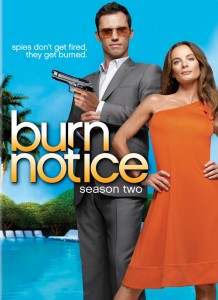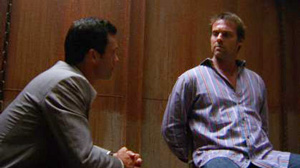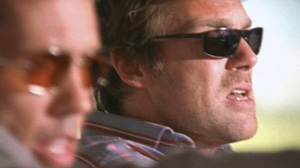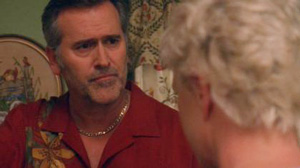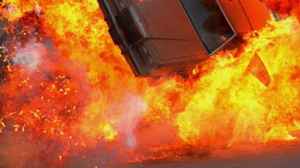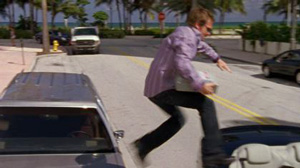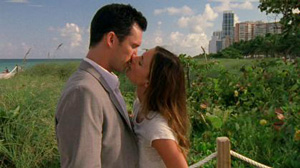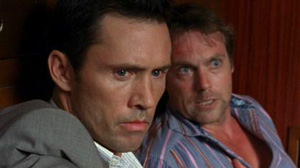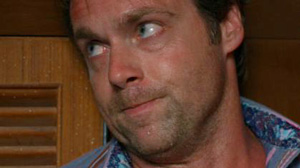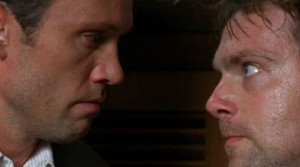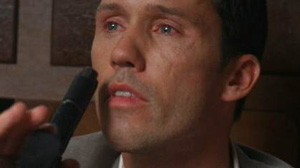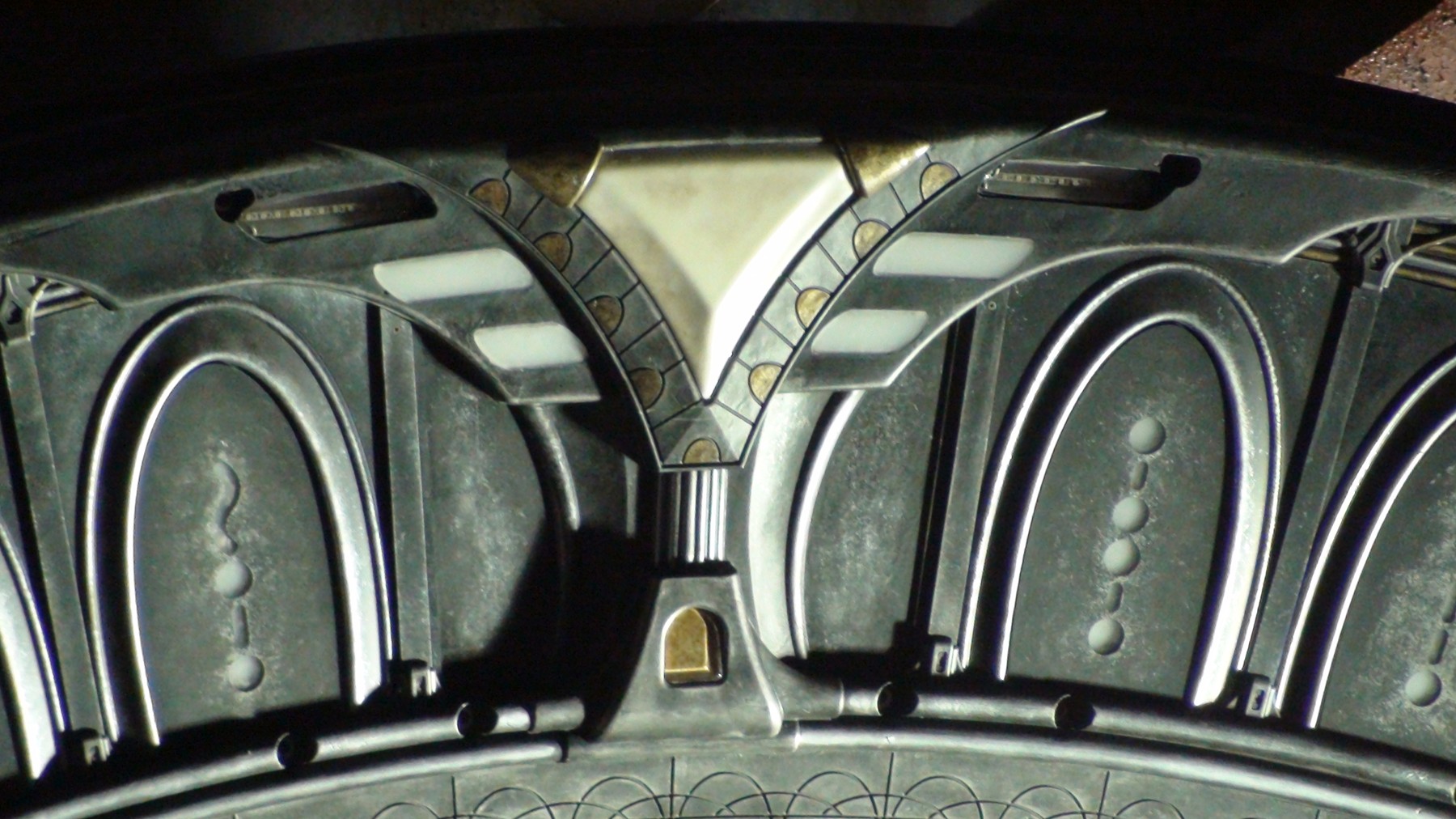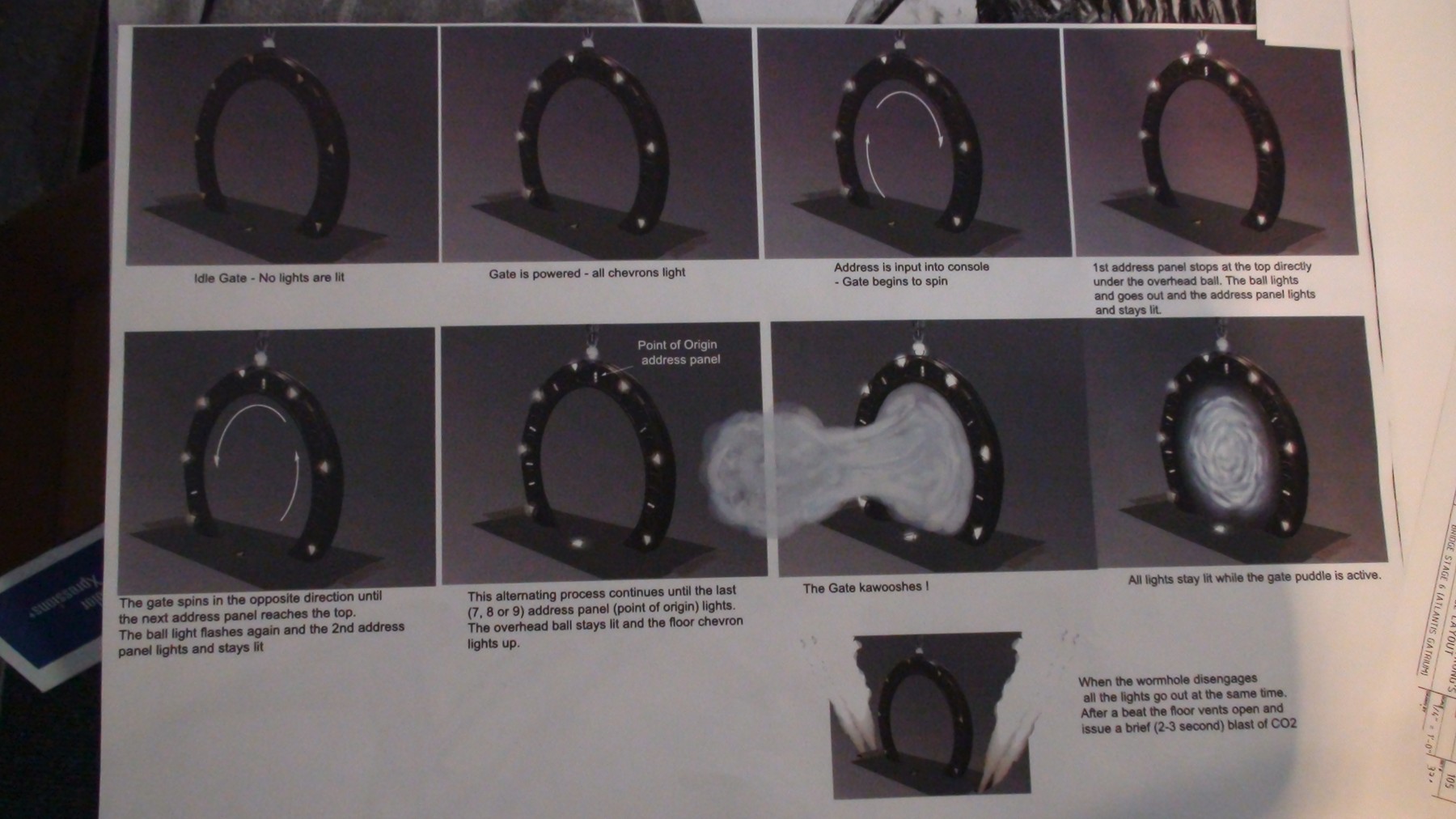
Let’s continue down memory lane in our Thirteen Weeks for Thirteen Years (13-4-13) series as we cover Stargate SG-1 Season Four!
During this season, co-creator and executive producer Jonathan Glassner stepped down to creative consultant, while Joseph Mallozzi and Paul Mullie joined Brad Wright and Robert Cooper as staff writers. Of the two new writers, Joseph Mallozzi had the most interaction with fans due to his online presence, so a new level of fan involvement with the show began and has continued to this day.
Two other events of note were the directorial debut of Michael Shanks for the episode ‘Double Jeopardy’ and the story contribution of Christopher Judge for ‘The Warrior,’ the screenplay and direction coming from fan favorite Peter DeLuise.
The production was given a fifth season on Showtime, so in Stargate tradition, the fourth season ended with a cliffhanger.
SG-1 Season Four
Brad Wright
From Creating the Gate” in TV Zone #123 (Feb. 2000):
“The difficult thing about Stargate is that as a television series it’s fairly massive in scope. It’s a big concept. I mean, the Stargate itself is 20 feet high. When we ‘visit’ another planet and want to put a Stargate there, which makes sense considering our heroes arrive through one, that means that the walls of our set have to be at least 30 feet high.

“Suddenly you’re building this huge set just to accommodate the Stargate. The solution to that is to go outdoors on location. Well, we can do that but there are only so many areas in and around Vancouver that don’t have trees. In some of our early episodes it was, ‘OK, here we are on this planet with trees,’ and then the following week it was, ‘Here’s another planet and, oh, look, it has trees.’ We had a hard time mixing the stories up enough (to show that) there are other worlds that have a totally different look and feel.
“Jonathan [Glassner] and I have been remarkably good at spinning yarns out of thin air while under duress. Whenever it seemed as if everything was falling apart, we could calmly sit down together and dream up an idea that ended up becoming a pretty good or, sometimes, great story. He’s a terrific guy and I’m going to miss having such a powerful writing machine across the hall.
“We can’t get stale. I don’t want to get to a point where the viewers are saying, ‘Isn’t this a variation on one they’ve already done?’ We have to make sure that we continue to come up with solid, entertaining stories. After all, that’s what us Science Fiction fans want.”
From “Perfect 10” in Stargate SG-1/Atlantis: The Official Magazine, issue #17 (Jul./Aug. 2007):

“We had just a little more money [in Season Four than we had in Season Three]. I hate to be crass about it, but we have this problem of trying to tell stories sometimes and then we realize we can’t afford to tell the stories that we want to tell. So you end up with shows that seem lacking, simply because we bit off more than we could chew. And we had a little bit more money and so we could do shows like ‘Small Victories,’ which involved going into a Russian submarine! That was pretty cool.

“But also, that was the year that Joe [Mallozzi] and Paul [Mullie] came aboard. That’s really when the core writing team started to come together. We had Rob [Cooper], myself and Paul and Joe writing. At first I had to re-write the material a bit, but eventually they got better and better.
“‘Window of Opportunity’ is a highlight for me. I really think that’s a funny episode. But my favorite Stargate SG-1 is ‘2010.’ That was great too, because it was Andy Mikita‘s first directing opportunity for us, and he hit it out of the park. It’s really well directed. A lot of things came together very nicely for that episode. So I guess I’d have to say that was my highlight.”
Joseph Mallozzi
From “Joseph Mallozzi’s Weblog” (Dec. 23, 2007):

“I got my start in animation. After querying dozens of animation studios, I was invited to forward some writing samples to one studio that was about to start production on a couple of animated shows. They liked my samples (a Seinfeld spec and a feature), sent me the show bible, and invited me to pitch. They bought one of my pitches and so began my professional writing career. I eventually worked my way up from simply writing for animation to story-editing and development. Then, using my background in animation (where I learned to hone my craft) and armed with those live-action specs, I moved into live-action with my writing partner Paul Mullie, working on a teen comedy called Student Bodies. After work on various shows, some good, some not so good, some not even not so good (Big Wolf on Campus, Lassie, Largo Winch, The Lost World) we were invited to pitch for Stargate SG-1 (after Robert Cooper had read our spec feature – Note how important it is to have a spec script or two if you’re looking to break into the business). We pitched, sold a pitch, and a did a good enough job on our first script (‘Scorched Earth’) to land us on staff.”
From “Q & A” hosted by sg1_hc Yahoo! List (Jan. 12, 2002):
“Prior to our joining the staff, we screened the first three seasons.

“Before we pitch a story, we always ask: ‘What’s in it for the character?’ Stories that hold an emotional stake (besides ‘I hope I don’t get killed’) are, in my opinion, the most interesting. ‘The Curse,’ for instance, was one of my fave episodes of Season 4 because it allowed us to explore a part of Daniel that hadn’t been touched upon, namely the life he left behind when he joined the Stargate Program.
“‘Upgrades’: One of my all-time favorite episodes. Robert Cooper did a huge rewrite on this one, one of the funniest episodes the show has done.
“‘Point of No Return’: Turned out exactly as we had imagined it.
“‘2010’: After reading the first draft, I had to pick up the phone and congratulate Brad. My fave script of the past two seasons (Seasons Four and Season Five).”
From “Joseph Mallozzi’s Weblog” (Dec. 8, 2007):

“To those who say ‘Hey, this is too much like this episode!’ or ‘This is too much like that episode!’ my counter would be ‘Name me an episode of science fiction that isn’t in some way like something that has come before.’ Alternate worlds, time travel, duplicates—they’re all standard science fiction jumping off points. It’s how they are used, what makes them unique within the body of a given story that really matters. I think back to ‘Window of Opportunity.’ When we first pitched out the story, it was very dark and very different from the finished episode. Robert Cooper gave us notes and steered us in another, lighter direction. ‘This is just like Groundhog Day,’ I realized, expecting that would kill the idea. ‘Exactly,’ was Rob’s surprising response. So we did the Stargate SG-1 version of Groundhog Day—and it became a fan favorite! Why? Because people who watched it were less hung up on the similarities of what had come before, and more interested in what made this particular situation unique to OUR characters.”
Richard Dean Anderson
From “Universal Soldier” in XPosé (Sept. 1999):

“It’s been like a runaway express train. The distribution side of things is tremendously successful and creatively we are constantly in a growing and explorative position. It’s like, ‘What can we do next?’ We are only limited by our imaginations.
“Our stories and the planets visited by SG-1 team reflect the fact that all the peoples we encounter are born of Earth’s history so in a way we already have an international flavor. We create our own languages but we tap into all cultures from Ancient Greek to Old Egypt to Christianity. I think we’re pretty diverse.”
From “TV Guide Online Chat” at AOL (Jun. 29, 2000):
“I’m one of the executive producers, but Brad Wright is the show runner, which means that he’s the executive producer and head writer. He has the reins of the control of the show. He and Robert Cooper are the brain trust of ideas and direction of the show.

“I have a fair amount of say in the directing and final product. And I have some say in character direction. I’ve been a bit of spoilsport in the romantic tension between O’Neill and Carter. It’s just too easy a direction to go. We do have some creative license with how we portray the characters within the military setting we have. I do have a fair amount of say, and I’m part of the team that comes up with the final product. But, I do give most of the credit to Brad Wright.
“I’m ecstatic about [the fan following]. I was very aware of the limitations of working with a cable audience. There is a massive differential between networks and cable. And I knew that there was going to be limited exposure. But, in regards to the fanship that we have developed, MGM and Showtime are very happy. And MGM is talking in terms of year twelve. I’m so happy about it, and I should make a blanket apology that I’m still a bit of a recluse. Most of the fans we’re aware of come through the computers and the online responses. And we’re one of the highest rated shows on Showtime, and that’s saying something.

“[J]ust as we speak, I’m finishing the polishes on a script [for ‘The Curse’] where I’m fishing. Not to give too much away, Teal’c and I do make it up to the lake. We find out that it’s not about catching the fish to O’Neill. It’s about being on a dock, with a pole in the water, and a cool beverage at his side. And Teal’c doesn’t quite get it. But, I’m not really a fishing fan. I do have two cabins up in northern Minnesota, in what is called the Iron Range. I go up there twice a year. One of the last things I consider is fishing. I float. I have some ATVs, and I go back into the woods. What fishing I have done is spear fishing, to make it fair. But, I haven’t done that in a while.

“Well, I’m the most irreverent. I may actually be the one who stands in the way of everyone being as professional as they can. It’s just kind of an uncontrollable trait that I have because I want the set to be as light and as fun as possible. So, that’s kind of my role… They’re all extremely professional. They’re wonderful individuals. Michael Shanks is probably the most serious… he did Shakespeare last year. Amanda gets all the techno-babble. I think she’s got the toughest job. And Chris Judge actually has the hardest job because in real life he has so much energy. He’s created a phenomenal character, very stoic and seemingly emotionless. We love to give him more to do, and sometimes it’s hard to find the emotional thread to carry a full storyline. But, he doesn’t work out enough… :)”
From “Family Man” in TV Zone (Aug. 2000):

“Of course, viewers don’t see half of what we do in front of the cameras, and thankfully so. Sometimes I think our rehearsals are what we should be taping. To some degree, I’d say Michael Shanks and I probably have the most fun in banter scenes. I think this is built partially out of a mutual respect of the theatre of the absurd and the fact that we have a ball working together. Michael’s also a very fine actor and one of the most tolerant people when it comes to my wacky behaviour. All the characters are starting to have more fun, though, and that’s good to see.

“It would be great if the writers could get everything into a script but it’s impossible. I’ll often think of things I want to do or say on the day of filming, but most of these little nuances are meant to grab the ears of those who are really listening. If you catch one of these ‘Jackisms’ that’s great, just as long as it doesn’t get in the way of telling the story.”
From “Gatecrashing” in SFX (Aug. 2000):
“The only thing I’ve ever demanded as an actor/producer is a sense of humour. If there’s not a sense of humour in the workplace, people resent having to come to work. Through all the years of MacGyver and everything else that I’ve done I’ve tried to infuse as much of my sense of humour as possible. People have to be able to laugh and loosen things up; laughter frees people a little bit and makes it worth coming to work.
“For nine months out of the year, some of these people get up at 3:30, 4:00 in the morning; I get up at 5:30 so I have the luxury of an hour’s extra sleep. For them to come here and not be afforded the chance to smile or laugh along the way really seems like drudgery to me, so I try to make sure that people know that I’m serious about what my responsibilities are, but not to carry them out with a heavy hand; allow people, don’t make them. Everybody has their input, the best idea wins around here. We’re not saving lives, we’re not doing brain surgery; we’re making a product for people to be entertained by.”
Michael Shanks
From “Michael Shanks: Action Jackson” in TV Zone #134 (Jan. 2001):

“I love it when our writers take two characters with such opposing views, like Jack and Daniel, and pit them against each other. It not only makes for interesting drama but also a neat moral debate topic for the viewers.
“[‘The First Ones’ is] a terrific one just in terms of the sense of humour and irony that Brad Wright and Peter DeLuise brought out in my character. Daniel was in his element. He spent the entire episode trying to be compassionate and communicative towards this Unas [Dion Johnstone], which, I feel, is where my character’s strengths truly lie. It was a pleasure to work with my pal Dion, who I had performed with on stage in Hamlet. He is a consummate actor who worked hard to bring his character to life and, in doing so, made it easy for me to work off him.

“Peter DeLuise also directed that episode, which made the shoot all the more enjoyable. Peter is the ultimate peacemaker. He’s also an actor and understands what his fellow actors need to guide them through a scene… He’s an excellent actor’s director. Technically, he’s also a great storyteller. Peter isn’t afraid to get in there and get the job done. We have a lot of fun with him.
“Our writers, Joseph Mallozzi and Paul Mullie, wrote this story [‘The Curse’] in eight days after being told that Richard was going to be away for most of the week’s shooting. I had a wonderful time working on this one. The director is friend of mine, Andy Mikita. We had fun going back to the show’s Egyptian mythology roots and delving into Daniel’s past.”
From “Problem Solved” in TV Zone Special #42 (Jul. 2001):

“[‘Absolute Power’] was a hoot on so many different levels. I remember the producers came to me and asked if I was worried about Daniel being painted as the bad guy. I said, ‘Are you kidding? It’s a great opportunity for me.’ First off, this is something that could happen to Daniel, so it was fascinating to explore that potential danger. From an acting standpoint it was a treat to twiddle the old ‘villainous moustache’ and do something totally different and off-the-wall.”
From “Michael Shanks: Action Jackson” in TV Zone #134 (Jan. 2001):
“I remember during the first read-through of the script [for ‘Double Jeopardy’], everyone said, ‘Oh, my God.’ Then the rookie director, me, looked at the script and thought, ‘You’ve got to be kidding.’ It was the luck of the draw or just the chips falling where they may, but I ended up with the biggest episode we’ve done since the series began. It was an overwhelming situation to be dropped into, to say the least.

“This episode had quite an ambitious storyline and a number of elements to it. It was probably our longest shoot in the history of the series. Usually we do seven-and-a-half days of principal photography, but in this case it took us ten days. We haven’t gone over time like that since our first year and, in particular, when we shot our pilot episode.
“I have to give kudos to the entire Stargate cast and crew. They were super. When I committed myself to this, I did so knowing that I was going to be supported. Everybody stepped up to the plate and was very tolerant and patient with me as I was feeling my way through the process. The questions come much faster to an experienced director and the demands made on him or her are a lot higher. With me, the crew was like, ‘Let’s just take a breath. We don’t have to put the heat on him because he’s going through enough already.’ The actors were the same, and that helped boost my confidence level.

“Our writers dream up some great ideas when it comes to writing Daniel stories, and I’ve had some excellent ones this year. I relish those episodes as they allow me to spread my wings as an actor. Unfortunately, in group situations they’re still not quite sure what to do with my character. I think that’s been a common theme since the series began. Daniel is a bit of a loner and a bit of an outsider and, to top it off, he’s not a soldier. So when the fighting starts what do we do with him? We have him crouch behind a rock and leave him out of the action or we don’t have him in the scene at all.
“I’m just saying that I think Daniel has been slightly limited in his actual interaction with the team. Again, stories where he has been the focus have been wonderful, but they sort of end up excluding the rest of SG-1. So if anything, my wish for next season would be for my character to be worked a little more into the group dynamic.”
Amanda Tapping
From Starsigns” in Dreamwatch (Feb. 2001):
“When we shot the pilot we knew we were picked up for two years, and I think through season one we knew we’d go four seasons… and now we’ve just found out that we were going for five.

“This is a role that requires a lot of stamina. I think that as an actor I’ve learned how to channel my energy in the right directions. I think the biggest challenge is keeping Carter fresh and keep her interesting—it’s easy to fall into autopilot doing any show, so I make sure that I don’t become complacent. I’m constantly trying to find what makes her tick, in any given scene or episode. We’re learning how to conserve energy. At the end of season one we were all sick as dogs; at the end of season two [we] were so exhausted we could barely speak; at the end of season three it wasn’t so bad and now, at the end of season four, we’re sorta, ‘Okay, we can do it!’ It’s a learning curve.
“This season has been about solidifying who [Carter] is, about solidifying relationships. The first part of the year had a lot about her feelings for Jack, and thankfully we’ve got over that! I think it’s far more compelling when it’s about two co-workers who have an obvious attraction to each other. I think as soon as you answer that questions [about the relationship] or bring it into the foreground, it becomes uninteresting.”
From “Amanda’s Q&A with Fans” (Dec. 5, 2001):

“In that [final] scene in ‘The Other Side,’ the most important objective for me was to convey that sense of ‘oh my God, what have we done?’ I feel very strongly as Sam and as Amanda that we don’t have the right to be judge, jury and executioner to any culture. While we may disagree with people’s politics we are not in the business of deciding what is right for the people of any planet we visit. Now, certainly genocide or the erradication of people simply because of the colour of their skin, is so obviously wrong. We all know that. We, in our own history, are still dealing with the evils of that. But, does SG-1 have the right to knowingly kill a man for this, as his way of life is being destroyed? Could we have not brought him to trial on his planet after the dust had settled? Or heard both sides of the story on the war and made an intelligent decision based on that? Also, what gives us the right to make that kind of decision? Long story short-ish, I wanted Carter to show disappointment in O’Neill and the fact that she questioned his judgement. While I disagreed with their war and why it was being fought, I still struggled with our final judgement of him.”
From “Gate Pride” in SFX (Feb. 2001):

“I disagree with [having a love relationship between O’Neill and Carter] entirely. I think that it’s enough that we know there’s an attraction, a magnetism, a certain chemistry between these two characters; I think that to push the envelope further is a big mistake, a) based on their military rank; b) based on this incredible dynamic of the team; c) I don’t wanna become ‘Jack’s girl’. I think Carter is so much more than that. I also feel that it’s really tired, to have the male and female lead of the show to fall in love. I just think that we have the potential to be so much more intelligent than that.
“When I first read [in ‘Window of Opportunity’ that O’Neill and Carter kiss], I went, ‘Oh, jeez!’, but then they put in a bunch of other stuff that he and Teal’c did that took away from that. Initially it was just that moment, but then they came up with the golf through the Stargate and the pottery and riding the bike through the SGC, so thankfully they took away from that being the only thing O’Neill would do.”
From “Gating Away” from Star Quest Online (2001):

“[The decimation of a sentient race such as the Goa’uld is] sort of a double edge sword, because on the one hand, this is an evil race—they are trying to destroy Earth so we do need to protect ourselves from it… By the same token, the character of Teal’c was one of them and has gone to the other side: he’s an incredibly warm character, loyal, dedicated and honourable. So I have this thing where I think: what if I’m killing another Teal’c? This guy has a wife and family… But you’re in a war situation, and war is war. You do whatever you need to protect yourself, your country or in this case, protect the planet. But there’s part of me that thinks there’s got to be… you know, sort of bad Karma with that, and I would love to show how they, and especially Carter—’cause I play her—deals with that when she puts her head down on her pillow at night. Does she think about that? I think that she would, there would be great feelings of guilt sometimes. You know, you talk to any soldier who’s been through a war and there’s this sort of shell shock: ‘Oh my God, what have I done? My comrade in arms beside me was killed, he has a wife and child and we shot that guy…’ You know there is an interconnection to the human race and we never really deal with that.
“Because it’s war, you’re in a situation; the Goa’ulds are coming over the hill and they’re gonna take over the base; you’ve got to stop them with whatever means possible. That’s the soldier mentality and you have to have that, otherwise what are you doing there? As a human being, there’s a sense of consequence, how do you deal with that consequence? I wish they would write a back story; how do you deal with this, what are the psychological implications? [But we’re] in a genre: it’s a sci-fi show, not a soap opera…”
Christopher Judge
From “Christopher Judge: Profile on Teal’c” Special Feature in Season Two DVD Set (2002):

“Well, a lot of the roles I’ve done have been very narrow in scope in that they are always the disenfranchised cop or the cop who came from a bad neighborhood and was angry about the way things were going in this particular environment that he was in and felt helpless to make a change. That’s not only frustrating as a person, it’s frustrating as an actor.
“This role, on the other hand, is—I can actively make changes in these different worlds that we go to, especially worlds that I have previously been on in another capacity, and I come back to these worlds in a different capacity and can affect the change and a change in my personal relationships with all these indigenous, and sometimes not indigenous, life forms. That’s just so exciting—just the many levels that I can play and what’s also challenging is that my character’s not used to being able to express his emotions and so the challenge for me—to try to make my emotions felt through not saying a lot of words but just letting things play across my face and body, I just think that’s such a challenge as an actor.”
From interview in Cult Times #54 (Mar. 2000):

“Every season I go back after hiatus and plead Teal’c’s case for hair but every year I get rejected. Now the original reason for being bald was that Teal’c was higher up the ladder in the Jaffa hierarchy and shaved his head as a mark of strength and power. Now that he is becoming more comfortable with the humans, I think it’s time he let his hair down.”
From “Walking Tall” in TV Zone (Aug. 2000):
“I just thought it [the soul patch] could be part of Teal’c’s ongoing assimilation process. Of course, then they started coming up with questions like, ‘How do we introduce it? How do we explain it? Why it is blond?’ That was the big one. There’s a quick reference to it in our fourth-season opener ‘Small Victories’ and that’s that. The writers definitely didn’t want to dwell on it!

“Teal’c has taken on a number of human characteristics and he’s definitely learnt how to better express himself emotionally. In an episode this season called ‘Crossroads’ we actually see him involved in a relationship with a woman from his past. He gets to experience a whole range of feelings and it was just so much fun doing that. If we’d done this story back in the first season it would have been completely different and, I think, personally, not as compelling. So I’m pleased with the way it turned out.

“Another change we’ve seen in Teal’ c is that he’s participating more by offering his input into what SG-1 does. I mean, he’s still the big strong guy who helps beat up the bad guys but now he’s suggesting ways of how to do it. Teal’c has become intertwined in these peoples’ lives and with what’s going on around him in the Stargate complex, giving him the impetus to contribute more vocally. I have to tell you, because I didn’t say a lot those first couple of seasons, which I was completely in favour of, my reaction to a situation was more honest. It wasn’t scripted, let’s put it that way. I find now that I’m speaking more I have to try a lot harder to listen, and I don’t always catch as much as I used to. So that in itself makes my performance different.”
From interview in Cult Times #54 (Mar. 2000):
“You know, people are always asking me why Teal’c is so reticent, why he never seems to say much or venture his opinions when it’s obvious to him that the humans are making a huge mistake. My take is that Teal’c feels that to learn something you have to experience it. His superior intelligence and experience tell him that it’s appropriate to keep quiet and let events unfold as they will in order to teach the humans valuable lessons. Obviously, he will do anything to prevent them getting hurt or killed but like a good parent, he sometimes just lets them get on with it. Plus, that O’Neill is way too irreverent for his own good.”
From interview in Cult Times #62 (Nov. 2000)

“I loved when O’Neill and Teal’c play golf [in ‘Window of Opportunity’]—we really are good at that. Our juggling was pretty good too.
“That was one of the considerations for the producers and writers this season—just trying to decide when the time was right to really open the character up to his other side. I mean, Teal’c is from human stock, right? It stands to reason he would revert back at some time or another. I think the producers’ timing was appropriate and now, even in situations that maybe aren’t so good, Teal’c shows that he has a dry sense of humour and gets to act on it, so I’m enjoying it thoroughly. I have to admit that I was getting a little tired of keeping a stony face.”
From “Walking Tall” in TV Zone (Aug. 2000):
“One of the great things about Teal’c is that he’s popular with children. I get a lot of requests for autographed pictures and I’m invited to appear at events designed to raise money to help kids. Both Stargate and my character allow me to become involved in causes that I don’t know if I’d be involved in otherwise. It’s certainly one of the most rewarding things about this job. After all, what’s more important than taking care of our children?”




























































